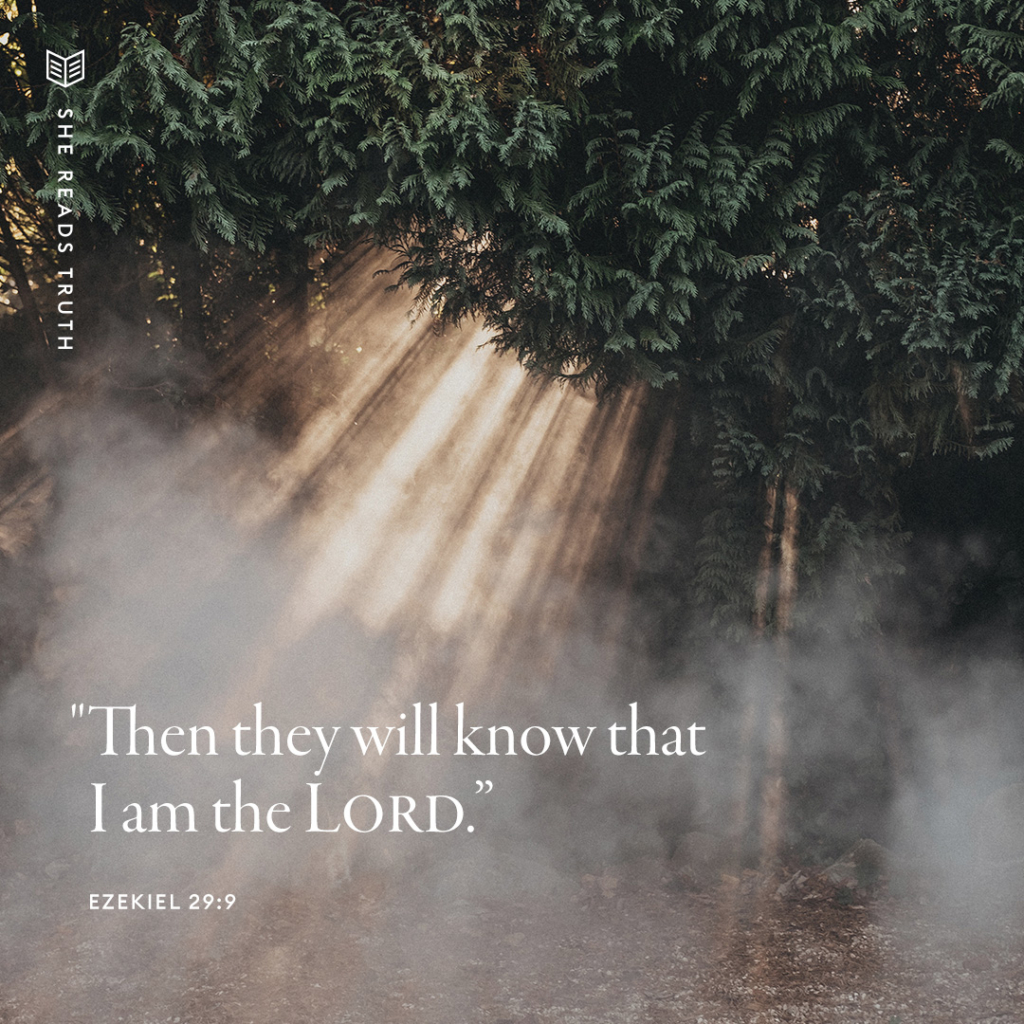A Prophecy of Egypt’s Ruin
Open Your Bible
Ezekiel 29:1-21, Ezekiel 30:1-26, Romans 5:6-11
BY Yana Conner
In my early twenties, a mentor of mine sat me down to share with me a concept called the “good-bad split” from Henry Cloud’s book Changes That Heal. This concept speaks of how, as humans, we tend to either go all good on a person—only seeing the savory parts of them, or all bad—solely viewing them through the lens of their unsavory ones. She then explained that my emotional and spiritual immaturity resulted from my inability to see people comprehensively, taking note of their “bad” and “good” parts. It hurt, but it was helpful.
Her wisdom has carried me through a host of conflicts and disappointments over the years. It’s also greatly challenged my view of God. You see, I can tend to focus solely on God’s “savory parts”—His compassion and grace. I’d rather ignore or even erase the parts of Him I find confusing or uncomfortable—like His wrath and judgment. But our God wants to be known, worshiped, and loved comprehensively.
In Ezekiel, God communicates over sixty times that the desired outcome of His actions is to be known as the Lord, Yahweh. In the book of Exodus, He sought to make Himself known through acts of deliverance, and in Ezekiel, He makes Himself known through His acts of judgment. Yes, He is a “compassionate and gracious God, slow to anger and abounding in faithful love and truth…forgiving iniquity, rebellion, and sin” (Exodus 34:6–7). He also “will not leave the guilty unpunished” (v.7). Like my momma sometimes reminded me that she was not one of my little friends to be trifled with, Yahweh is making it clear that He too is not to be trifled with by Pharoah, Israel, or anyone else. He is a God of grace and truth, compassionate love, and righteous judgment.
When we isolate His compassionate love from His righteous judgment, we do not see God comprehensively and create Him into an image of our own making. And though we do not intend to split God in two, how many worship songs do we sing about God’s righteous wrath? How many times have we followed a chronological reading plan and said, “I can’t wait to get to Matthew”? When we create this kind of dichotomy in our knowledge and worship of God, we can either go all bad on Him—only seeing Him as a wrathful, or go all good—only acknowledging Him as a gracious Savior. However, He is always both.
During this Lenten season, we are reminded that at the cross, He graciously saves prideful and idolatrous sinners by pouring out His wrath on Himself in the person of Jesus Christ. However, if we persist in splitting God’s character, we will either cheapen His sacrifice at Calvary or miss it altogether. We must seek to know Him as He has revealed Himself to us in Scripture.

61 thoughts on "A Prophecy of Egypt’s Ruin"
-
Hi I’m from the U.K. and when I do my reading there are no comments but I always go back to find your comment “ Churchmouse” your wisdom , understanding on such a practical level are a joy to me…
-
I needed that commentary as Im reminded that God is in everything, the highs lows and His is a good good Father.
-
@Carissa, having early posting issues too! I wanted to add that I sort of think of it in terms of disciplining my children when they were teenagers. Some of their behavior made me very angry; however, I didn’t make decisions regarding consequences based on my anger but based on what I hoped would help them learn the necessary lesson as well as be the natural consequences for their poor choice or behavior. I also prayed that as I was disciplining one teen the other would take note and perhaps learn from their sibling. My first child was a learned the hard way kid so I think my second child did experience this benefit, lol!
-
I think the difference may be that although God is angry he is not acting out of that anger, he’s acting from a place of needing to discipline based on fair and just judgement on his part, to teach and correct those being judged and so that onlookers can learn and see that he is who he says he is.
-
Thank You for loving me even in my sin Father. Thank you for mercy I dont deserve and Grace I didn’t earn by Jesus Blood. In Jesus name, Amen
-
Thanks Yana for pointing out that we need to look at all of God’s personality. His grace is all the more wonderful when considered next to the fact that we deserve his righteous judgment. Thank you, Lord, for your mercy and grace!!
-
Thanks Yana for pointing it
-
I think your first question is one we all need to think through from time to time. We see the wages of sin (death) all throughout scripture starting with Adam eating the fruit and “surely” dying (even though it wasn’t swift and immediate). Then there’s the flood, the Exodus plagues, the book of Joshua…. Remembering that God is sovereign really helps me. I think studying the book of Job helped me think through his Sovereignty and the way He governs. His wrath is Righteous and is deserved. In fact, I don’t deserve anything but His wrath based on what I have done or haven’t done – I’m so thankful that He loves us so much that instead of pouring out His wrath on me, Jesus took the wrath on the cross.



Post Comments (61)